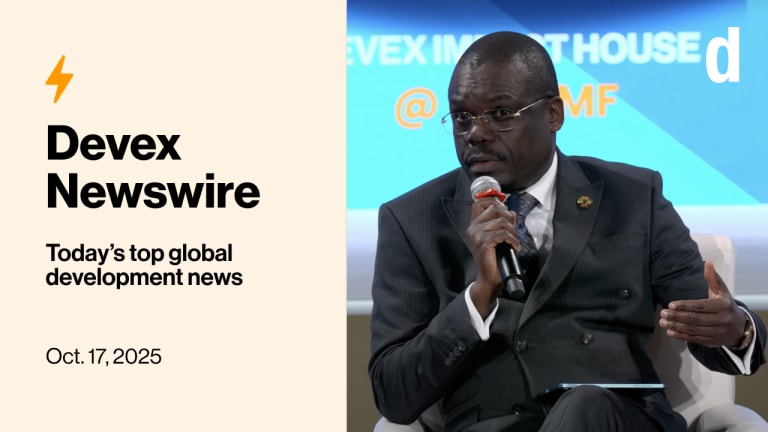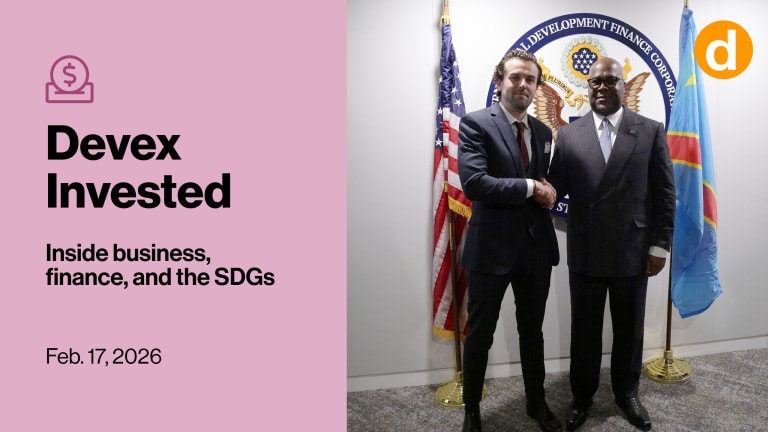Truss putting investment at center of UK foreign policy, says CDC Group chief
Last week, the United Kingdom announced broad reforms to the country's development finance institution, CDC Group. Devex speaks with Chief Executive Nick O’Donohoe about what the changes will mean for the organization's work.
U.K. Foreign Secretary Liz Truss is “putting investment very much at the center of her foreign policy discussions,” according to the head of the United Kingdom’s development finance institution. “I think she sees correctly that the U.K. has got a significant competitive advantage when it comes to finance and investment through having the world’s largest financial center situated [in London], and she wants to leverage that,” Nick O’Donohoe, chief executive of CDC Group, told Devex in an interview. His remarks came shortly after Truss announced CDC Group — which is owned by the Foreign, Commonwealth & Development Office — is undergoing reforms, including being renamed “British International Investment” in April 2022. “Some people … might worry we’re becoming wholly infrastructure-focused,” he added, “That’s absolutely not the case.” --— Nick O’Donohoe, chief executive, CDC Group “This is a win-win for all,” said Truss during the announcement. The foreign secretary, who has a reputation as being fiercely pro-free market, continued: “It benefits Britain by creating jobs and opportunities for our people. And it helps grow economies across Asia, Africa, and the Caribbean while drawing them closer towards free-market democracies and building a network of liberty across the world.” O’Donohoe told Devex via Zoom that Truss’s emphasis on investment was also an important part of her development policy. “When we talk about investment in a development context, we’re typically talking about development finance, and that is typically allocated through our bilateral development finance institution, which is CDC,” he said. “We've been given additional capital over our last five-year strategy period, I suspect we will get given additional capital the next five-year strategy period, the foreign secretary indicated that [while announcing the reforms] ... we don’t know how much yet, but I think it will be likely to be less than we got in last cycle.” Critics of CDC Group have voiced unease that the institution is getting more funding while other areas of the aid budget have been cut, but the institution believes that is an issue for the government, which decides funding allocations and policy. O’Donohoe said that “Not just in the U.K., but I think in every donor country, the proportion [of ODA] that goes to development finance is increasing, ours in the U.K. is actually on the lower end when you compare it and benchmark it to many other European countries.” While European DFIs have been growing, investments fell by nearly 20% in 2020 according to the Association of European Development Finance Institutions. Addressing people who expressed concern that “development” has been dropped from his organization's new name, O’Donohoe said: “I don’t think they should be worried.” He added: “Anyone who doubts that development is not still at the center of what CDC does should look at the investment policy ...for the next five years. That’s very clear, it centers our investments around inclusion, sustainability, productivity.” O’Donohoe also said discussions about a name change had been ongoing for at least a year. “We were, alongside the government, keen to have this company be more visibly British,” said O’Donohoe, noting it is often clear which countries European DFIs — such as Swedfund — represent, and that many don’t mention “development” explicitly in their names. The institution will still be bound by the International Development Act and CDC Act, said O’Donohoe. So what will the new and expanded CDC Group actually do? “A lot of what we’re doing is the same as in the past, and building on what we’ve done in the past,” said O’Donohoe. “What's different going forward is there is an ambition the government has for CDC/BII to be broader, particularly when we talk about our role in climate change … really this [reform] positions us as the U.K. government’s principal provider of climate finance to developing middle-income and lower-middle-income countries around the world.” There will be an increased focus on middle-income regions — and with it, some changes in geographical orientation. The DFI wil “pivot” into new Southeast Asian countries, adding to its mandate “specifically for climate finance,” according to O’Donohoe. He said: “Countries that had been really out of scope for us, like Indonesia, Vietnam, the Philippines, that have significant climate challenges, will now be in scope.” But current stomping grounds such as India and Pakistan will “continue to be important” he said. This move east was of little surprise to observers, as the government has touted its Indo-Pacific tilt for at least a year, and O’Donohoe said the CDC Group was a part of that policy. The addition of the Caribbean region to CDC Group’s ventures was less expected. “There are only a limited number of ODA eligible countries, but when you look at the climate challenge there, particularly around adaptation and resilience, it’s significant,” said O’Donohoe. But he added: “In the overall scheme of our portfolio, it will be fairly small.” Sub-Saharan Africa will remain “front and center in CDC’s investment geographies,” said O’Donohoe. “We are one of the largest equity investors in sub-Saharan Africa, we’d expect that to remain the same,” he added. Equity will remain a “significant majority” of CDC Group’s portfolio, said O’Donohoe, while debt will also increase, including for financial services and corporate debt. There will be no sovereign investments but the group is looking at the possibility of investing in state-owned enterprises. CDC Group will also continue to invest in funds but “we'll try to confine that to more specific, impact-oriented, more sector-specific funds,” said O’Donohoe. CDC Group will continue to invest in its principal sectors of infrastructure and climate, financial services, and SMART sectors — standing for services, manufacturing, agriculture, real estate, and technology. Partly because of Foreign Secretary Truss’s comments suggesting CDC Group’s finance could be used to rival China’s Belt and Road Initiative, significant attention has been given to infrastructure. But O’Donohoe cautioned that politicians “use that term very broadly … they are also talking about technology infrastructure, telecoms infrastructure, even financial infrastructure … it has quite a broad definition.” “Some people … might worry we’re becoming wholly infrastructure-focused,” he added, “That’s absolutely not the case.”
U.K. Foreign Secretary Liz Truss is “putting investment very much at the center of her foreign policy discussions,” according to the head of the United Kingdom’s development finance institution.
“I think she sees correctly that the U.K. has got a significant competitive advantage when it comes to finance and investment through having the world’s largest financial center situated [in London], and she wants to leverage that,” Nick O’Donohoe, chief executive of CDC Group, told Devex in an interview.
His remarks came shortly after Truss announced CDC Group — which is owned by the Foreign, Commonwealth & Development Office — is undergoing reforms, including being renamed “British International Investment” in April 2022.
This story is forDevex Promembers
Unlock this story now with a 15-day free trial of Devex Pro.
With a Devex Pro subscription you'll get access to deeper analysis and exclusive insights from our reporters and analysts.
Start my free trialRequest a group subscription Printing articles to share with others is a breach of our terms and conditions and copyright policy. Please use the sharing options on the left side of the article. Devex Pro members may share up to 10 articles per month using the Pro share tool ( ).
Will Worley is the Climate Correspondent for Devex, covering the intersection of development and climate change. He previously worked as UK Correspondent, reporting on the FCDO and British aid policy during a time of seismic reforms. Will’s extensive reporting on the UK aid cuts saw him shortlisted for ‘Specialist Journalist of the Year’ in 2021 by the British Journalism Awards. He can be reached at william.worley@devex.com.








